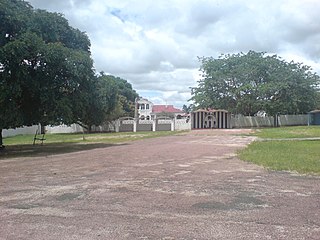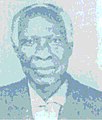
Angola, officially the Republic of Angola, is a country on the west-central coast of Southern Africa. It is the second-largest Lusophone (Portuguese-speaking) country in both total area and population and is the seventh-largest country in Africa. It is bordered by Namibia to the south, the Democratic Republic of the Congo to the north, Zambia to the east, and the Atlantic Ocean to the west. Angola has an exclave province, the province of Cabinda, that borders the Republic of the Congo and the Democratic Republic of the Congo. The capital and most populous city is Luanda.

Battle of Mbwila occurred on 29 October 1665 in which Portuguese forces defeated the forces of the Kingdom of Kongo and decapitated king António I of Kongo, also called Nvita a Nkanga.
Menongue, formerly Serpa Pinto, is a town, a municipality, and the capital of Cuando Cubango Province in Angola. The municipality had a population of 320,914 in 2014. It is one of the four municipalities in Angola whose inhabitants are predominantly Mbunda.

The Ovimbundu, also known as the Southern Mbundu, are a Bantu ethnic group who live on the Bié Plateau of central Angola and in the coastal strip west of these highlands. As the largest ethnic group in Angola, they make up 38 percent of the country's population. Overwhelmingly the Ovimbundu follow Christianity, mainly the Igreja Evangélica Congregacional de Angola (IECA), founded by American missionaries, and the Catholic Church. However, some still retain beliefs and practices from African traditional religions.

Lozi people, or Barotse, are a southern African ethnic group who speak Lozi and Silozi, a Sotho–Tswana language| Khelobedu. The Lozi people consist of more than 46 different ethnic groups and are primarily situated between Namibia, Angola. Botswana, Zimbabwe, South Africa including half of the north-Western and western provinces of Zambia inhabiting the region of Barotseland.

Mongu is the capital of Western Province in Zambia and was the capital of the formerly-named province and historic state of Barotseland. Its population is 179,585, and it is also the headquarters of Mongu District. Mongu is the home of the Litunga, King of the Lozi people.
The Municipality of Bundas lies at the south-eastern corner of Moxico Province of Angola near the border with Zambia. Its principal town is Lumbala. Due to the destruction of the Angolan Civil War, it is one of the most remote municipalities in Angola and access remains a large problem despite significant progress, as many roads are still not cleared of land mines and many bridges remain destroyed, but easily accessed by a tar road from Luena and a gravel road from the Zambian border to N'inda and a tar road to Lumbala N'guimbo.
Luchazes is a town and municipality in Moxico Province, Angola. It is one of the four Municipalities predominantly inhabited by the Mbunda in Angola. Its principal town is Kangamba. The municipality had a population of 14,451 in 2014.

The Kingdom of Bailundo, also known as Bailundu, Mbailundu or Mbalundu, is an Angolan Ovimbundu kingdom based in the modern-day province of Huambo, in the central highlands of Angola. It was one of the largest and most powerful Ovimbundu kingdoms. Some news reports state the kingdom was founded in the 15th century, however oral histories and archival evidence suggest it emerged as a political entity around 1700. The kingdom was initially called Halavala.
Viye was one of the traditional Ovimbundu kingdoms, located in the central plateau of Angola. Its capital city was Ecovongo.
In the 1900s in Angola the colonial economy expanded despite domestic unrest.
Mavinga is a town and municipality in Cuando Cubango Province in Angola. One of the three municipalities in Angola. Predominantly inhabited by the Mbunda and municipality had a population of 27,196 in 2014. It comprises the communes of Mavinga, Cunjamba/Dime, Cutuile and Luengue.
Mbunda is a Bantu language of Angola and Zambia. There are several dialects: Katavola, Yauma, Nkangala, Mbalango, Sango, Ciyengele ("Shamuka"), and Ndundu, all of which are closely related. Mbunda was one of six languages selected by the Instituto de Línguas Nacionais for an initial phase to establish spelling rules in 1980 to facilitate teaching in schools and promoting its use.
Mulambwa Santulu was the 10th litunga (king) of Barotseland who ruled from 1780 to 1830. He is one of the most fondly remembered Luyana kings. He is famous for introducing a series of reforms such as a new constitution into the Lozi Kingdom. He has been called "Mulambwa Mutomi Wa Mulao" which translates to "Mulambwa the creator of laws."

King Mwene Mbandu I Lyondthzi Kapova was the 21st monarch of the Mbunda people in the southeast of present-day Angola before the Portuguese colonization of the Mbunda territory at the beginning of the 20th century, specifically Moxico. The prince played a significant role in the war against the Chokwe. He took over the Mbunda Kingdom from his nephew King Mwene Katavola II Musangu.
The Mbunda or Vambunda are a Bantu people who, during the Bantu migrations, came from the north to south-eastern Angola and finally Barotseland, now part of Zambia. Their core is at present found in the south-east of Angola from the Lunguevungu river in Moxico to the Cuando Cubango Province.
Mwene Chitengi Chiyengele was a Mbunda king who led his people from south-eastern Angola to Barotseland in western Zambia around 1824. The Mbunda were skilled game hunters and fighters using bow and arrow. They were welcomed by King Mulambwa of the Aluyi of Barotseland, now Western Zambia.

Mbunda Lukwakwa Traditional Ceremony is celebrated by the Mbunda under Senior Chief Sikufele, during the first week of October every year at Manyinga of Kabompo District in North Western Zambia.

The Mbunda Kingdom, sometimes called the Kingdom of Angola or Mbundaland, was an African kingdom located in western central Africa, in what is now southeast Angola. At its greatest extent, it reached from Mithimoyi in central Moxico to the Cuando Cubango Province in the southeast, bordering Namibia.











